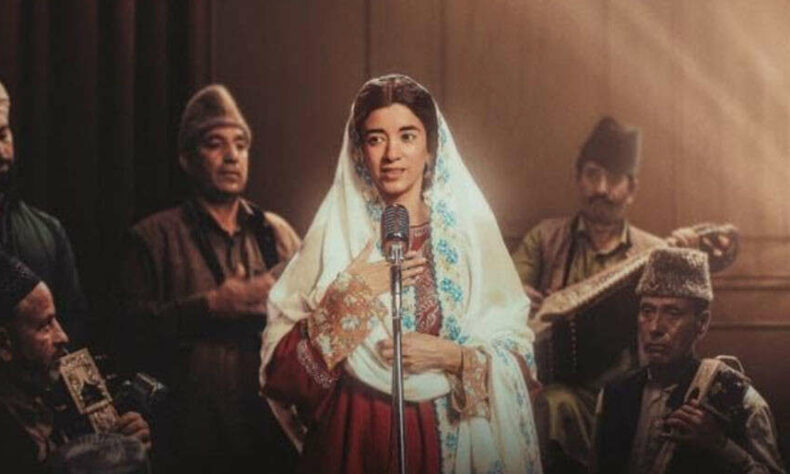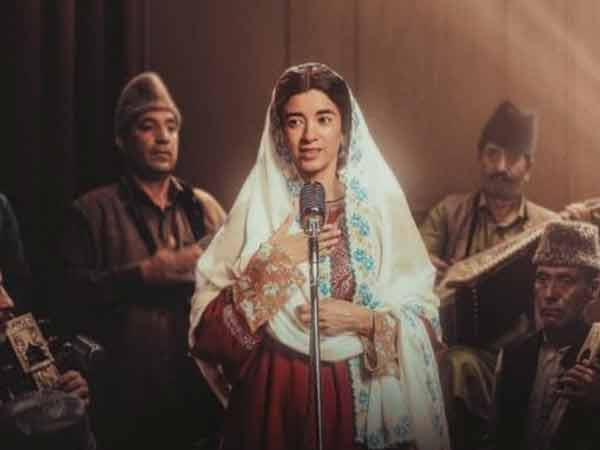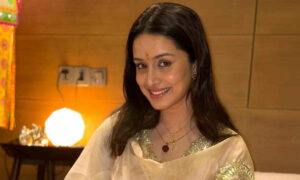

There was a time when Kashmir was known less for conflict and more for its music, poetry, and breathtaking landscapes. A time when the Valley’s beauty was measured in verses and melodies rather than headlines of violence. Danish Renzu’s Songs of Paradise harks back to this gentler era, weaving a cinematic ode to one of Kashmir’s greatest voices, Raj Begum, the first woman to sing on Radio Kashmir and later revered as the “Melody Queen of Kashmir.”
Set in 1954 Srinagar, the film follows Zeba (Saba Azad), a young woman with a gift for song, who dares to step into spaces where women were not welcome. She is the only woman in the recording studio, eating lunch in solitude, navigating a workplace without even a toilet for her, and yet her voice becomes a defiant act of presence. Through the eyes of a young music researcher, Rumi (Taaruk Raina), we meet the older Zeba (Soni Razdan), who reflects on the battles she once fought, for dignity, for respect, for the simple right to sing.
Renzu’s film is steeped in nostalgia, not only for the soundscape of Radio Kashmir but also for the syncretic culture of the Valley. Here, music bridges divides, poetry shapes thought, and a young girl’s song becomes an assertion of identity. This is not the Kashmir of modern Bollywood thrillers obsessed with terrorism; it is a Kashmir of weddings, gardens, rivers, and radio waves humming with possibility.
The performances form the film’s beating heart. Saba Azad’s Zeba is a portrait of understated rebellion, her shoulders hunched in public, her words measured, her presence demure, until she takes her place before a microphone. Then, her voice soars with a confidence the world has denied her. Azad captures Zeba’s humility and quiet determination with remarkable precision. In turn, Soni Razdan mirrors these traits in her portrayal of the older Zeba, her expressions weathered with time but still luminous with resolve. Together, Azad and Razdan seem less like two actresses playing the same character and more like one woman glimpsed through the prism of time.
The supporting cast enriches the journey. Sheeba Chaddha brings sharpness to the role of Zeba’s orthodox mother, while Bashir Lone as her tender father lends her dreams a fragile hope. Shishir Sharma, as the Ustad who recognises a lotus blooming in muddy waters, and Zain Khan Durrani as the poet Azaad, who later becomes her husband, provide Zeba the guidance and encouragement she needs, embodying the men who helped her step into the public light.
Music, naturally, is the film’s crowning glory. Abhay Sopori recreates Kashmiri melodies with reverence, while Masrat-un-Nisa’s haunting voice, which performs Zeba’s songs, feels as though it belongs to the crackling radios of the 1950s. Each song brims with longing, evoking a world where music was not merely entertainment but heritage and faith.
If the screenplay occasionally falters, smoothing over Zeba’s obstacles and rendering her rise more effortless than it likely was, the atmosphere makes up for it. Renzu’s restrained, classic storytelling style lets the film breathe like a long ballad, filled with small, tender moments: Zeba humming at her window, hesitating before sitting too close to a male composer, or lowering her eyes even as her voice soars across the Valley.
At its core, Songs of Paradise is less about struggle and more about celebration, the celebration of a voice that refused to be silenced, of a culture remembered through song, and of a Kashmir where music and poetry once reigned supreme. And in the seamless duet of Saba Azad and Soni Razdan, the film finds its most lyrical note. The film is currently streaming on Amazon Prime Video.
📰 Crime Today News is proudly sponsored by DRYFRUIT & CO – A Brand by eFabby Global LLC
Design & Developed by Yes Mom Hosting





